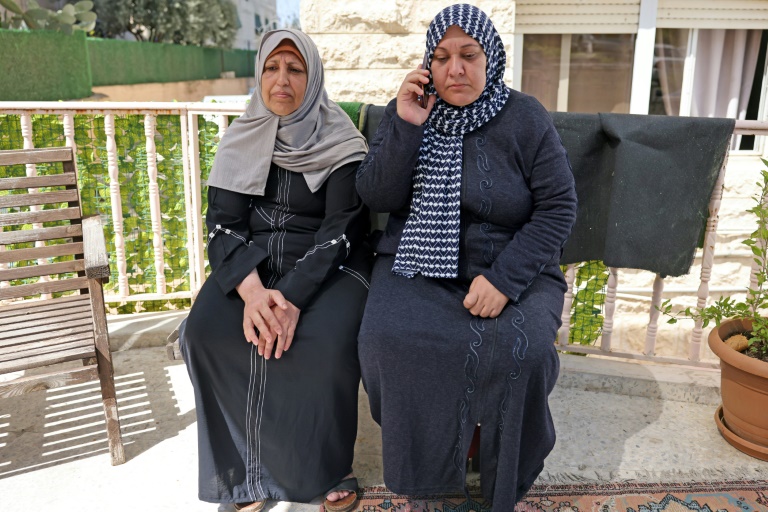Gaza cancer patients fear Israel move to force them back ‘to hell’

Palestinians Rim Abu Obeida (L) and Manal Abu Shaaban are waiting anxiously to learn if they’ll be sent back to war-torn Gaza
Jerusalem – In a small hotel near the Augusta Victoria Hospital in Israeli-annexed east Jerusalem, where she received radiation therapy for breast cancer, Palestinian Rim Abu Obeida waits anxiously.
She is among a group of Palestinian patients living in limbo while a top Israeli court weighs whether they can be sent back to war-torn Gaza now that their treatment is completed.
Like dozens of Gazans before the Israel-Hamas war erupted, she was granted permission to leave the territory for care because hospitals in the Gaza Strip did not have the necessary equipment.
“This week, we were suddenly told we had to return to Gaza. This is sending us to hell, to death!” Abu Obeida told AFP.
If she is forced to leave she won’t have much to return to — her house in southern Gaza’s Khan Yunis has been destroyed in Israeli’s offensive against Hamas.
The roughly 20 patients from Gaza, most of them battling cancer, have been receiving treatment in Tel Aviv and east Jerusalem for the past six months.
COGAT, the Israeli defence ministry body that governs civilian affairs in the occupied Palestinian territories, said this week that because the patients “don’t need any continued medical treatment they are being returned to the Gaza Strip.”
But at the last minute, the Israeli Supreme Court, responding to a petition by the NGO Physicians for Human Rights, suspended COGAT’s order.
The court is expected to deliver a ruling in the case, though the timeline is unclear. The government has until April 21 to file its arguments.
– ‘Catastrophic conditions’ –
In the next room along from Abu Obeida, Manal Abu Shaaban was busy stashing food into her bags.
“I have rice, sugar, all the things they are deprived of there. I hope they won’t stop me from bringing them in,” she said.
Abu Shaaban, a breast cancer patient like Abu Obeida, said she was not opposed to returning, but she knew the security situation meant she would be unable to reach her home in Gaza City, in the besieged territory’s north.
“I want to go back. But to my home, in my house! Not in Rafah, in the south, where they want us to go, I don’t know anyone there,” she said.
Large swathes of the north have been flattened by Israeli bombardment and a UN-backed assessment said the area faces famine by May unless substantially more aid reaches it.
Meanwhile, in Gaza’s south up to 1.5 million displaced Palestinians are crammed into Rafah and live under the threat of a full-scale Israeli ground offensive.
Asked about the fate of the patients who face being returned to Gaza, Augusta Victoria Hospital director Fadi Mizyed paused for a few seconds.
“I don’t know. They will go back in a war zone, they will be at risk, they will be living in catastrophic conditions,” he said.
“The situation in Gaza is beyond description, with no guaranteed healthcare services that can do what is needed for any cancer patients.”
“We said we don’t think it’s the right thing to do but at the end of the day it’s not our call,” he added.
– Patients conflicted –
The war in Gaza was triggered by Hamas’s surprise October 7 attack on southern Israel which resulted in the deaths of about 1,160 people, mostly civilians, according to an AFP tally of official Israeli figures.
Israel’s retaliatory campaign to destroy Hamas has killed at least 32,070 people in Gaza, mostly women and children, according to the health ministry in the Hamas-run territory.
While fighting rages, Mizyed said, the patients facing a possible return to Gaza are conflicted.
“On one hand they want to go back to see their families and to be closer to their families, even if the conditions are unthinkable,” he said.
On the other, they know that to go back is to risk death “not only from the cancer but from the war as well”.
According to the United Nations, fewer than one-third of hospitals in Gaza are even partially functioning.
Hospitals have been frequent targets of the Israeli military, which accuses Hamas of using them as command centres.
Ahmad Said, a 60-year-old patient also treated at Augusta Victoria, which was set up to serve Palestinians, previously lived near Al-Shifa Hospital in Gaza City, the territory’s largest.
Witnesses this week reported air strikes and tanks near the sprawling medical complex crowded with displaced people — the latest instance of Israeli operations in the area.
Israeli troops previously raided Al-Shifa in November, sparking international outcry.
Said told AFP his house, like so many others, had been destroyed, and that some of his relatives were living in tents in Rafah.
If forced to leave east Jerusalem, he would like to join his daughter in Canada.
He is adamant that he has no desire to go back to Gaza.
“Why would you want to transfer us to a dangerous place?” he asked.
